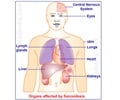Pulmonary fibrosis is a progressive lung disease that, according to the Pulmonary Fibrosis Foundation, claims the lives of 40,000 people every year.
Pulmonary fibrosis is a progressive lung disease that, according to the Pulmonary Fibrosis Foundation, claims the lives of 40,000 people every year. There's often not a known cause although smoking and some occupations are risk factors. Now, a new treatment may give patients what they're looking for -- more time.
Michael Dixon is enjoying every minute he has with his wife Debbie. Earlier this year, his doctor told him he had a lung disease called pulmonary fibrosis. "He gave me, at most, a 50/50 chance of making five years, and that's when it sunk in," Michael tells Ivanhoe.He only has half of his lung capacity right now, but as time passes, it will decrease even more. He says, "The hardest part was telling my kids that I might not be around."
Michael is determined to stay around, so he enrolled in a study at Tulane University Health Sciences Center with Pulmonologist Joseph Lasky, M.D..
"The idea of the use of Gleevec is to stop the disease from getting worse once the patient has been diagnosed," Dr. Lasky tells Ivanhoe.
Gleevec has received national attention for its success in treating leukemia. Because fibrosis and cancer share some of the mechanisms of the development of the disease, Dr. Lasky says doctors thought it might be of some benefit for the patients who have fibrosis.
In this disease, scars form on the lungs. Those scars soon take over, and the lungs stop working. Based on lab studies, Dr. Lasky says Gleevec should stop that scarring.
"At best, we hope to stop the progression of the disease," he says. "It's our hope that the treatment of Gleevec will increase the length of their life as well as improve the quality."
The research is currently ongoing to find out just how effective Gleevec is.
For the study, Michael takes six pills a day and hopes they'll give him and his lungs a little more time. "I'd say 99 percent of the time, I believe it's going to work out. I'm hopeful," he says.
There are several sites involved in the study across the United States and one site in Mexico. Most common side effects of Gleevec include nausea and fluid retention.









